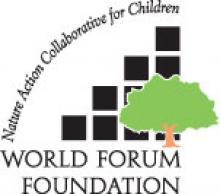
As a collection of landscape architects, community planners, environmentalists, and early childhood educators, the Nature Action Collaborative for Children (NACC) is dedicated to re-connecting children with the natural world. Recognizing that children worldwide face societal, technological, and environmental conditions that are adversely affecting their physical and mental health, NACC is providing nature education resources to enrich their daily lives.
During a World Forum on Early Care and Education that was held in Montreal, Canada in 2005, a discussion began concerning the need to help children bond with nature. It was felt that this connection is vital for their intellectual and physical development, provides refuge and healing, and encourages a “sense of shared community among the world's peoples.”1 Further, it was felt that children who connect with nature grow into adults who care about protecting the environment.
A planning group emerged to launch the Working Forum on Nature Education for Young Children held in October 2006 at the Arbor Day Farm in Nebraska City, Nebraska. The founding organizers included Bonnie and Roger Neugebauer of the World Forum Foundation, John Rosenow of the Arbor Day Foundation, Nancy Rosenow of the Dimensions Educational Research Foundation, and Eric and Elyssa Nelson of the Child Educational Center/Caltech JPL Community.
At this forum, architects, planners, environmentalists, and educators from 25 nations gathered, shared information, and made plans, which included the formation of the Nature Action Collaborative for Children.2 In the NACC, each of the six world regions are represented by three professionals from the collaborating professions - landscape architects and community planners, environmentalists, and early childhood educators.
Six months later, these leaders met and presented at the World Forum on Early Care and Education held May 2007 in Kuala Lumpur, Malaysia. They also planned the next Working Forum on Nature Education that was held in 2008 at the Arbor Day conference center in Nebraska. Subtitled “New Tools for Connecting the World's Children with Nature,” this Working Forum gathered 280 delegates who participated in outdoor art, music and photography, learned of center and play yard transformations, and received tools for advocating the child and nature connection.
The NACC has joined with the World Forum Foundation, IBM, and the Dimensions Foundation Nature Explore staff to assemble a Connecting Children with Nature Environmental Action Kit. This is part of the commitment that the World Forum Foundation made to the Clinton Global Initiative: to connect two million young children with nature over two years’ time.3 Young children were defined as children ages three through eight.
The Action Kit is an online gathering of resources, research, guides, and advocacy tools, including Universal Principles, a declaration of baseline beliefs for children, families, design professionals, and educators. For children these principles include that children need nature-based outdoor and indoor settings on a daily basis, that they are “competent, powerful learners and risk-takers” who can choose how they create and learn through nature, and that children can develop life skills through nature-based learning.4
Key components in the Action Kit are the Toolkit for Early Childhood Programs and Toolkit for Families which employ multi-sensory thematic activities. Each kit is based on a four-fold format: Have an Adventure, Take Action, Celebrate Your Action, and Keep Growing.5 Both the kits cover such topics as plants, air, water, soil, energy, human health, and animals and insects, with the early childhood kit going into greater depth in each area.
NACC's 2010 Action Forum on Connecting Children with Nature occurred in October at the Arbor Day farm in Lincoln City, Nebraska. Since then, they continue to provide opportunities to gather and share information including collecting and disseminating research, provide professional growth and mentoring opportunities, and act as an advocate for the needs of children to have daily connections with nature.6 One such annual activity is their international Mud Day celebrated “wherever you live” on June 29.7
- 1. “About NACC.” World Forum Foundation. < http://worldforumfoundation.org/wf/wp/initiatives/nature-action-collaborative-for-children/about-nacc/ > 11 June 2012.
- 2. Ibid.
- 3. “The Story.” World Forum Foundation. < http://worldforumfoundation.org/wf/wp/initiatives/nature-action-collaborative-for-children/environmental-action-kit/the-story > 11 June 2012.
- 4. “Universal Principles.” World Forum Foundation. < http://worldforumfoundation.org/wf/wp/initiatives/nature-action-collaborative-for-children/environmental-action-kit/professional-collaborations/universal-principles/ > 11 June 2012.
- 5. “A Toolkit for Early Childhood Programs.” World Forum Foundation. < http://ccie-sharing.s3.amazonaws.com/NatureActionToolkits/Educator_Toolkit__ENG.pdf > 20 June 2012.
- 6. Op.cit., “About NACC.”
- 7. “Nature Action Collaborative for Children.” World Forum Foundation. < http://worldforumfoundation.org/wf/wp/initiatives/nature-action-collaborative-for-children/ > 11 June 2012.

